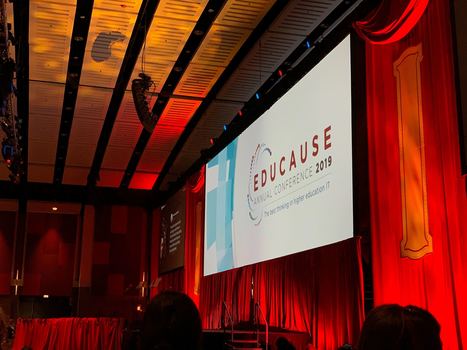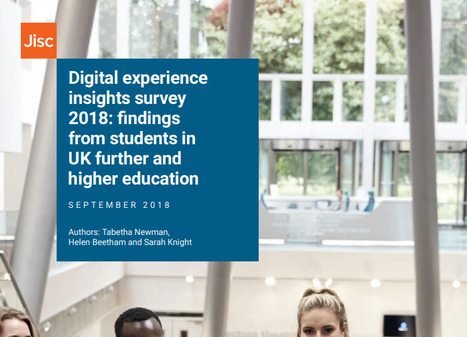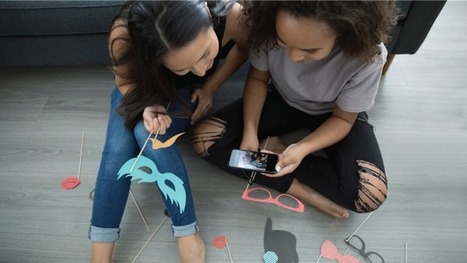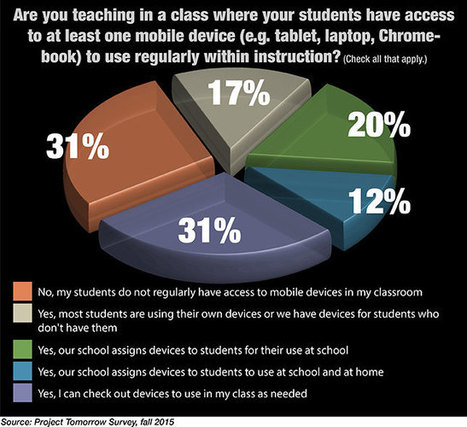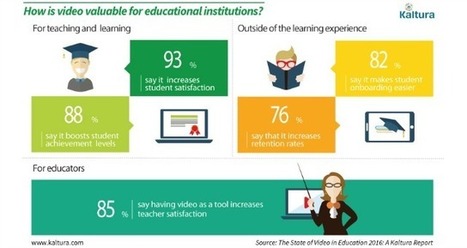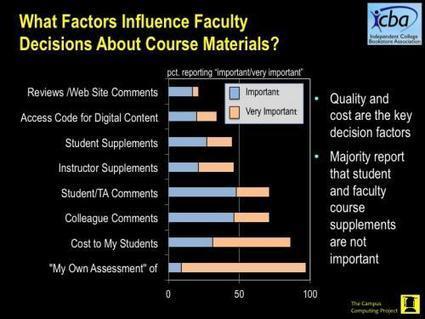Going into 2020, the push for institutions to support all students on their path to success underpins many of the top IT priorities for higher education leaders, according to new survey findings released this week by Educause.
“The focus of the student experience is very, very important and it’s reflective of a larger trend in higher education,” Susan Grajek, Educause vice president for communities and research, told EdScoop. “We are starting to recognize it’s not just students’ job to be successful, it’s the institutions job to help make them successful.”
Get Started for FREE
Sign up with Facebook Sign up with X
I don't have a Facebook or a X account

 Your new post is loading... Your new post is loading...
 Your new post is loading... Your new post is loading...
Current selected tag: 'survey results'. Clear
Key messages: Prepare students for digital learning
Authors: Tabetha Newman, Helen Beetham and Sarah Knight
Teens credit social media for helping to build stronger friendships and exposing them to a more diverse world, but they express concern that these sites lead to drama and social pressure
The ninth UCISA Survey of Technology Enhanced Learning (TEL) for higher education Report has been published. The Report offers a longitudinal perspective of TEL developments across the UK higher education sector, focusing on the current provision within universities and other higher education providers and the emerging and planned patterns of learning technology usage. This year’s Report draws on data going back to 2001 in its longitudinal analysis of TEL trends. In this blog post, we will explore some of the key findings from this year’s Survey, updating the picture that was reported on in 2016 (see corresponding blog post).
Our survey of more than 37,000 students (14,292 from further education) shows more than two thirds of further education (FE) students are turning to each other and their lecturers for technical support, overlooking online help for their digital queries
It asked the SRS community about what they thought were the most important search skills. (Take it by clicking here, if you want to see what the original survey was all about.)
Higher ed students believe universities can improve in the next 10 years by tracking their information.
Despite widespread acknowledgment of the advantages of mobile computing, students in nearly one-third of classrooms do not have regular access to mobile devices in the classroom. Via EDTECH@UTRGV
Quick, what’s your biggest teaching challenge? If you said it’s students who don’t read their assignments or prepare for class, you’re in good company. For the fourth consecutive year that we posed that question in our survey, Faculty Focus readers identified students who come to class unprepared as their biggest day-to-day challenge. It was followed closely by students who are not prepared for the rigors of college. Finishing third this year was institutional budget cuts, which edged out student motivation for the first time. Technology distractions remained as the fifth biggest challenge.
An annual survey on video in higher education found that more than half of the institutions who responded now use a video solution integrated into their Learning Management System. The figure is up 6% from 46% last year. In addition, three quarters of students in higher education use video in their assignments, up 4% on last year’s figure of 71%.
Quality and the cost of course materials for students emerge as the key factors that drive the decisions of college faculty about textbooks and other course materials. And although the movement to digital course content seems inevitable and a majority of the surveyed faculty express interest in adaptive technologies for their courses, it is also clear that college and university faculty have real concerns about some of the proclaimed instructional benefits of going digital.
A new survey looks at the ways readers discover scholarly publications. Due to methodological limitations, scholarly information professionals should practice caution in interpreting the findings and considering potential business responses. Ultimately, it is impressive that the researchers have taken on such a large-scale study, which adds some additional context to our understanding of discovery, especially…
Reviewed By: Katie Caughlan; Jeremy Hutchinson; Christian Larsen; Adrienne Mathewson; Tiffany Paisley Link to article: https://ojs.lboro.ac.uk/ojs/index.php/JIL/article/viewFile/PRA-V9-I2-3/2229 ; |
Mobile devices and other digital tools reshape how college students get classwork done.
When it comes to studying, today’s students aren’t hunkering down in libraries all night to prepare for big exams. Instead, they’re tucked safely in their dorms with a laptop or mobile device. A recent survey from McGraw-Hill Education found that 74 percent of students prefer to study at home, while only 14 percent indicate they prefer the library, probably because of the technology available to them at their homes.
Ofcom (the UK media and communications watchdog) have published (at end of January 2019) the Children and parents: media use and attitudes report 2018. As usual, it is based on robust research: 1,430 in-home interviews with parents of 5-15s and children aged 8-15 were conducted, along with 630 interviews with parents of children aged 3-4: undertaken in April-June 2018. It includes parents views about their children's use of media and devices.
The study by the Babson Survey Research Group, Freeing the Textbook: Educational Resources in U.S. Higher Education, 2018, was supported by a grant from The William and Flora Hewlett Foundation and is based on responses from more than 4,000 faculty and department chairs. The study shows improvements in OER awareness, and growing concern among faculty regarding the cost of course materials.
UCISA (the "member-led professional body for digital practitioners within education" in the UK) have produced their survey-based annual review of Technology Enhanced Learning in UK higher education. Although I think there is a caveat (see below) it is a useful document which presents a perspective on TEL development.
I am delighted to share with you a summary of the findings from the Jisc digital experience insights survey 2018. This report provides a unique national picture of how students are using
We recently held a webinar, “The Latest Word on Video in Education: Get the 2017 Survey Results,” to review the results of the State of Video in Education 2017. But during the webinar, we also polled our attendees. So we decided to share the results of that, as well!
New study reveals a major opportunity to enhance data-driven decision making around program development, enrollment and retention Via EDTECH@UTRGV
How can digital capability promote teaching excellence? Date 10/10/2016 New research commissioned by QAA and carried out by Sheffield Hallam University explores ways of using technology in teaching that are best for improving the student experience, and how institutions can put the findings into practice. Technology does not always transform learning, say the researchers. The report finds that: technology may have the capability to transform teaching but is not always used to its full potential technology can aid teaching, but is never a substitute for good teaching practice (such as student-centred learning) we can and should measure student satisfaction with technology-assisted teaching, but only as one element of effective teaching it is important to raise the digital skills of all staff, rather than just a few specialists. Professor Chris Husbands, Vice Chancellor of Sheffield Hallam University and Chair of the Teaching Excellence Framework, said: 'One of the most pressing of questions for university academics is to think in challenging and applied ways about the relationship between digital capabilities and teaching excellence. 'What makes that so interesting a question is the way it poses an enduring question: What does teaching excellence look like, in different contexts? And how does digital capability develop and what does it look like? 'It is important to explore and to understand the ways in which the opportunities afforded by changing technologies can support teaching of the highest quality.'
This document presents the results and trends from an analysis of the first nine years of data from the National Student Survey (NSS). The two main areas of investigation are the robustness of the NSS results, which is considered by investigating response patterns, and the difference between the NSS results split by a variety of student and course characteristics such as ethnicity, gender and subject.
Despite all the celebratory rhetoric around our nation's
From
www
In September 2012, ACRL was awarded a National Leadership Demonstration Grant of $249,330 by the Institute of Museum and Library Services (IMLS) for the project “Assessment in Action: Academic Libraries and Student Success” (AiA). Undertaken in partnership with the Association for Institutional Research (AIR) and the Association of Public and Land-grant Universities (APLU), the grant will support the design, implementation and evaluation of a program to strengthen the competencies of librarians in campus leadership and data-informed advocacy.
Digital humanities has had a significant impact on academic libraries. A new American Libraries/Gale Cengage survey shows uncertainty and adaptation. |



